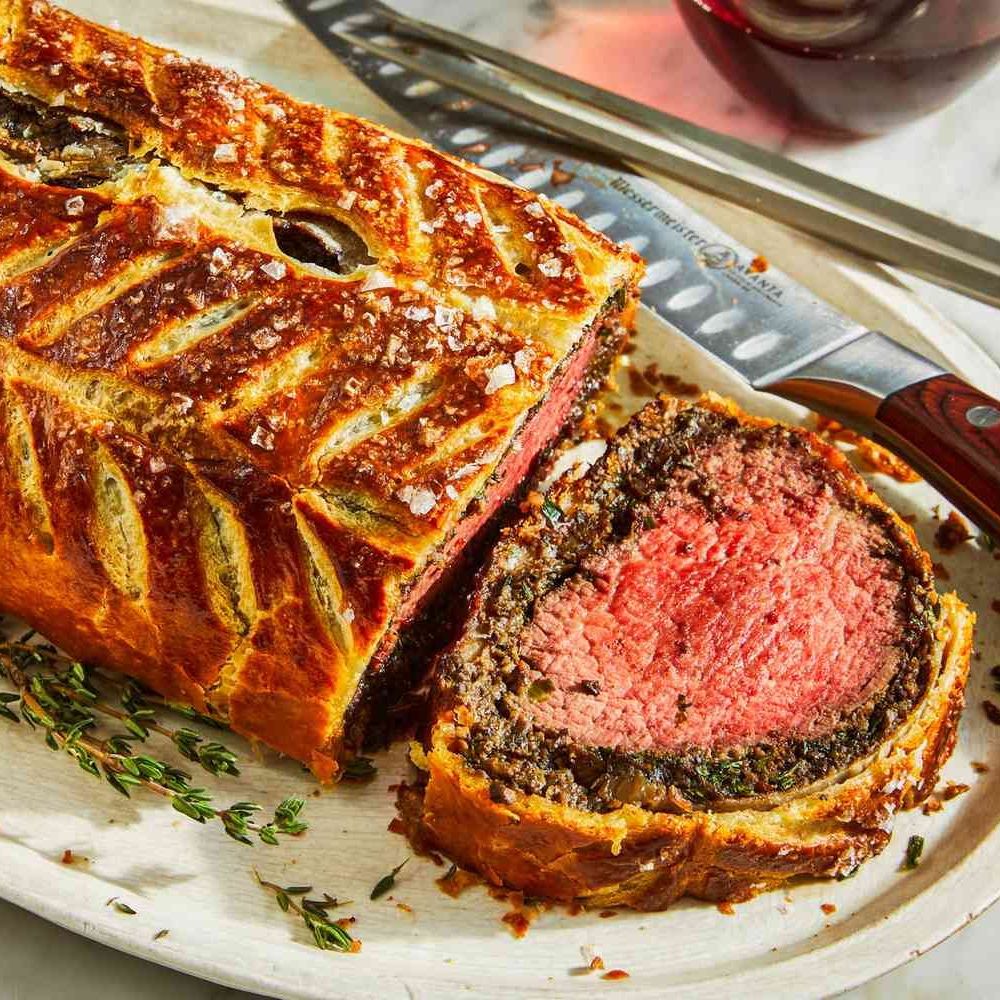


Using kitchen twine, tie tenderloin crosswise at 2-inch intervals, starting from center and working out to ends. Sprinkle beef all over with salt and pepper. Place on a wire rack set inside a rimmed baking sheet. Let stand at room temperature 1 hour. (To make ahead, chill, uncovered, 12 hours; let stand at room temperature 1 hour before cooking.)
Heat canola oil in a large skillet or a small roasting pan over medium-high until shimmering. Add tenderloin; cook, turning occasionally, until browned on all sides, 10 to 12 minutes. Transfer tenderloin to a wire rack set inside a baking sheet; let cool 15 minutes. Remove and discard twine. Brush tenderloin all over with mustard and sprinkle all over with porcini powder. Chill beef in refrigerator, uncovered, at least 1 hour (or up to 3 hours).
Pulse half of the cremini mushrooms and half of the shallots in a food processor until very finely chopped, about 10 pulses, stopping to scrape down sides and stir as needed so you have evenly sized pieces. Transfer mixture to a medium bowl. Repeat process with remaining creminis and shallots.
Melt butter in a large skillet over medium-high until foamy. Add cremini-shallot mixture; cook, stirring occasionally, until creminis are dry and beginning to brown and stick to bottom of skillet in spots, 25 to 30 minutes. Add garlic and thyme; cook, stirring constantly, until fragrant, about 1 minute. Add sherry and pepper, stirring to scrape up any browned bits on bottom of skillet. Cook, stirring often, until mixture is dry and just starts to stick to bottom of skillet again, 2 to 4 minutes. Remove from heat. Spread mixture out on a small baking sheet. Chill, uncovered, until cold, about 30 minutes. Cold duxelles may be stored in an airtight container in the refrigerator up to 2 days.
Moisten a clean work surface with a damp kitchen towel and overlap three pieces of plastic wrap on work surface to form a 22-inch square. Overlap the two phyllo sheets in center of plastic wrap to form a 13 1/2-by-12-inch rectangle, with long edge facing you. Overlap prosciutto on top of phyllo in two rows, leaving about a 1/2-inch border on the left and right phyllo edges. Spread duxelles evenly over prosciutto and gently press down to form an even layer. Sprinkle with chives and parsley. Lay chilled beef lengthwise over bottom third of duxelles. Roll up beef and phyllo into a log, using plastic wrap as a guide and keeping it on the exterior of the log. Hold the outer ends of plastic wrap and roll log on work surface back toward you to tighten. Refrigerate while you prepare the puff pastry.
Preheat oven to 425°F. Roll puff pastry out on a lightly floured work surface to a 15- x 12-inch rectangle with long edge facing you. Lightly brush top third of puff pastry with some of the beaten egg. Unwrap chilled beef log and discard plastic wrap. Lay log lengthwise on bottom edge of puff pastry. Holding edge in place, roll up jelly-roll style until log is completely wrapped. Roll to face log seam side up, and gently press overlapping dough to seal. Fold ends of puff pastry down over beef, pinching seams to seal.
Transfer beef log, seam side down, to a baking sheet lined with parchment paper. Brush off excess flour using a pastry brush. Brush puff pastry all over with beaten egg. Using a paring knife, very light score a line lengthwise down center of puff pastry. Very lightly score two lines parallel to the first, 1 on either side of the center line, and each spaced 1 1/2 inches outward from the center. Very lightly score zig-zag lines across beef Wellington, spacing rows 1/2 inch apart and forming a herringbone-like pattern. Sprinkle with flaky sea salt. Using the tip of a paring knife, create 3 (1-inch-long) steam vents along center line, spaced about 3 inches apart.
Bake until puff pastry is puffed and browned and a thermometer inserted into center of beef registers 120°F, 40 to 45 minutes. Using two large spatulas, carefully lift beef Wellington from baking sheet and transfer to a cutting board. Let rest 15 minutes. Using a serrated knife, cut into slices. Serve beef Wellington on a platter, garnished with thyme branches.